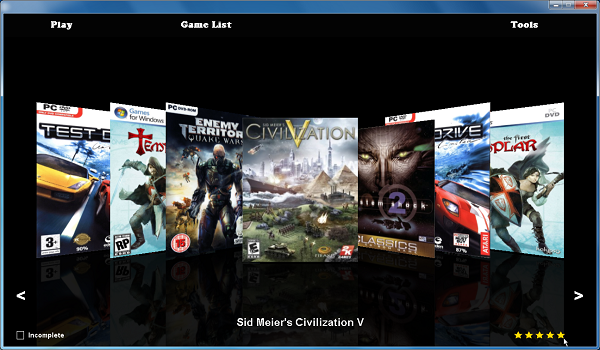
Apple is holding an education-themed event this week, and the usual gamut of unnamed sources and rumor-mongers have come to the consensus that the event will focus on Apple's plans to enter the e-textbook business, and possibly unveil a new interactive e-book publishing platform.
This rumor springs from the best-selling biography of late Apple CEO Steve Jobs, in which Jobs' biographer Walter Isaacson said textbooks were "the next business [Jobs] wanted to transform," and that the company had already had several series of meetings about making Apple e-textbooks a reality.
Recently, Washington, DC-based Gilfus Education Group released its annual list of the top five trends in education innovation for 2012, and unsurprisingly, e-textbooks topped the list.
Some have already predicted that Apple's presence would do the same thing for e-textbooks that it did for .mp3 retailing. That is to say, take an already existent (but disjointed) market and whip it into shape with a domineering hand. So before Apple's event takes place, we thought we'd compile a list of the big players in the e-textbook space to create a better picture of the e-textbook business and what Apple will be coming into.
Barnes & Noble Nook Study - Book retailer Barnes and Noble has approximately 2.5 million e-books of all types available, including e-textbooks. Nook Study lets students rent or buy e-textbooks on the web and read them in the Windows or Mac application. The application allows search, tagging, annotations, highlights, and printing. Unfortunately, Nook Study does not yet exist as a mobile application like the regular Nook e-reader does.
Amazon Kindle Textbook rental - Unlike Barnes and Noble, there really isn't much difference between Amazon's regular e-books and its e-textbooks. The cross-platform Kindle application deals with e-textbooks in the exact same way as regular e-books, but Amazon has an e-textbook rental program that lets students buy temporary licenses on books to save money.
Chegg - Chegg began as a textbook rental site in 2007 and grew to become one of the largest of its type. In 2011, the site branched out into e-book rentals, and began offering HTML5-formatted e-textbooks for consumption in the browser. Chegg has partnered with Cengage Learning, Elsevier, F.A. Davis, Macmillan, McFarland, Rowman & Littlefield, Taylor and Francis, McGraw-Hill, John Wiley & Sons, and Oxford University Press for content.
CourseSmart - This online vendor distributes digital material from many of the biggest textbook publishers like Chegg does. CourseSmart's partners include Pearson, McGraw-Hill Education, John Wiley & Sons, and Cengage. With its own desktop software, a Web-based e-book store, a developing mobile presence, and about five years in operation, CourseSmart is a highly visible channel for e-textbook distribution. CourseSmart and Chegg are currently the two most well-regarded e-textbook platforms.
VitalSource - Ingram Content Group's VitalSource is actually the platform that powers both Chegg and CourseSmart, making it the most widely used e-textbook platform in the world, reaching more than 180 countries and 6,000 universities globally. It's not the face that students see, but it is of immense importance in the still young e-textbook industry.
Kno - This startup from one of Chegg's co-founders first began in the hardware business, trying to get a dual-screen e-reader off the ground, but it eventually morphed into a software-only mobile application and e-book retail/rental store. Now the company has a selection of over 150,000 e-textbooks, and strives to be different by rolling unique learning features into its application, such as behavioral analytics, flash cards, and journaling.
Inkling - Like Kno, Inkling is a mobile application designed specifically for consumption on tablets, and like many of the other services, it offers e-textbook rentals. However, it differs in execution from the likes of Amazon and Barnes and Noble. Instead of renting textbooks for a period of time, students buy their books by the chapter, and each chapter generally costs between $1.99 and $21.99, as determined by the publisher. Right now, Inkling has only a few hundred textbooks available for purchase.
CafeScribe - Educational tools provider Follett Corporation launched its own browser-based e-textbook platform CafeScribe in 2010, and has already partnered with more than 800 university bookstores to be their e-textbook solution. Follett's library has more than 10,000 titles.
Nature Publishing - In 2011, 135-year old Nature Publishing wrote its first textbook, the "born digital" text called Principles of Biology. At just $45 dollars, Nature completely rebuilt the business of publishing textbooks to cater to the e-book generation. The result is a book that is more quick to market, more dynamic, and cheaper.
ScrollMotion - ScrollMotion differs slightly from most of the companies mentioned above because it designs standalone e-reading applications for content publishers, and created the HMH Fuse K-12 "iPad Textbook" app for Houghton-Mifflin Harcourt publishing. Publishers can, with this type of app, offer their content directly to students and consumers. This company is in an extremely important position to watch, because Gartner Research predicted that by 2016, more than 50% of all e-textbooks will be self-published. Making an e-textbook into a standalone app would make it more accessible and visible.
Lulu - Following the self-publishing train of thought, Lulu lets authors create their own e-textbooks, convert them to multiple formats, and assign them ISBNs for listing and sale across multiple e-book stores. Additionally, it has its own retail platform for both physical and e-book sales.
Scribd - Like Lulu, Scribd lets authors or content creators upload their e-textbooks and distribute them either for free or in the Scribd Store. The main drawback of these self-publishing platforms is that they lack the necessary peer review and content vetting that makes textbooks what they are. Gartner Research in December said we can expect providers such as Lulu, Smashwords and Scribd to expand on their peer review capabilities to answer this demand.
Flat World Knowledge - This five-year old company publishes complete, peer-reviewed textbooks under a Creative Commons open license and lets students read them for free online, or purchase them as affordable downloadable e-books or even as printed books. Educators who want to save their students a great deal of money on books and learning materials can choose to "adopt" Flat World texts into their curricula. These texts are given a unique URL and can be shared freely with students without the need for user profiles.
Image: Siamionau Pavel/Shutterstock



 Another major breach is in the headlines. Zappos, an online shoe and apparel retailer owned by Amazon, disclosed Sunday night that more than 24 million of its customer accounts had been compromised. Hackers accessed customer names, email addresses, phone numbers, the last four digits of credit card numbers and cryptographically scrambled passwords.
Another major breach is in the headlines. Zappos, an online shoe and apparel retailer owned by Amazon, disclosed Sunday night that more than 24 million of its customer accounts had been compromised. Hackers accessed customer names, email addresses, phone numbers, the last four digits of credit card numbers and cryptographically scrambled passwords. Steven Sprague is CEO of Wave Systems. His expertise lies in leveraging advancements in hardware security for strong authentication, data protection, advanced password management, enterprise-wide trust management services and more. Mr. Sprague earned a BS from Cornell University in 1987.
Steven Sprague is CEO of Wave Systems. His expertise lies in leveraging advancements in hardware security for strong authentication, data protection, advanced password management, enterprise-wide trust management services and more. Mr. Sprague earned a BS from Cornell University in 1987.

 Once you’ve finished working with a USB flash drive then it’s easy just to unplug it right away, but of course that’s usually not a good idea. If the Windows cache contains changes that haven’t yet been written to the drive then removing it may result in lost data, so it’s always best to eject the drive first.
Once you’ve finished working with a USB flash drive then it’s easy just to unplug it right away, but of course that’s usually not a good idea. If the Windows cache contains changes that haven’t yet been written to the drive then removing it may result in lost data, so it’s always best to eject the drive first.
 ISO images have been a popular means of distributing software for a very long time, so it was good to see Windows 7 finally introduce a tool to burn them to disc.
ISO images have been a popular means of distributing software for a very long time, so it was good to see Windows 7 finally introduce a tool to burn them to disc. Jan. 18, 2012 is designated SOPA blackout day, with prominent websites planning to go dark in protest of two bills working through Congress -- Stop Online Privacy Act and PROTECT IP Act (PIPA). If you've got a big school project due Thursday and plan on using Wikipedia, get your research done today. The community-based encyclopedia plans to go dark tomorrow, and it's not alone.
Jan. 18, 2012 is designated SOPA blackout day, with prominent websites planning to go dark in protest of two bills working through Congress -- Stop Online Privacy Act and PROTECT IP Act (PIPA). If you've got a big school project due Thursday and plan on using Wikipedia, get your research done today. The community-based encyclopedia plans to go dark tomorrow, and it's not alone.
 When a favorite USB mouse stopped working last week, I tried all the usual techniques to try and get it running again: so I unplugged and reconnected it, looked for driver updates, checked Device Manager for clues, and so on -- but with no success.
When a favorite USB mouse stopped working last week, I tried all the usual techniques to try and get it running again: so I unplugged and reconnected it, looked for driver updates, checked Device Manager for clues, and so on -- but with no success.